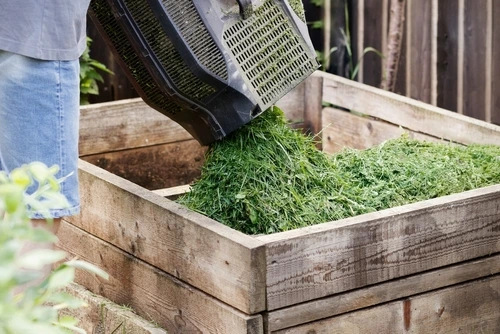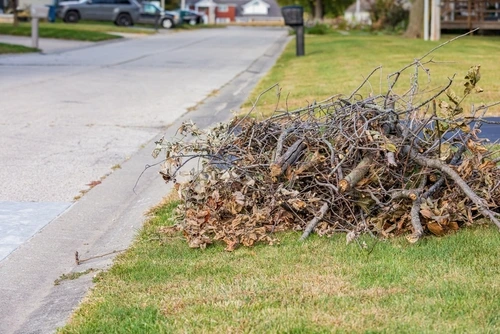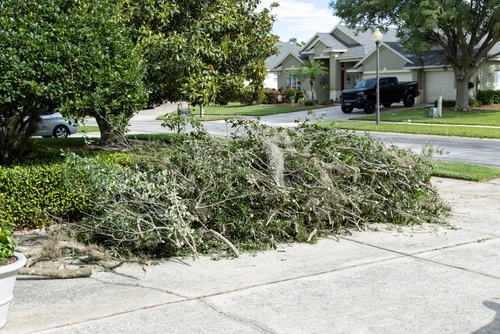Dealing with yard debris can feel overwhelming, especially after tackling a big landscaping project. While managing a few bags of waste might be manageable, using a yard waste dumpster rental simplifies the process when dealing with larger amounts. This option is particularly valuable for those who take on more extensive outdoor work and need a straightforward way to dispose of yard waste.
For regular yard maintenance, curbside pickup is a convenient option that provides ease and efficiency. However, not everyone has access to this service. Exploring facilities like local landfills, transfer stations, or recycling centers offers a more eco-friendly alternative.
Turning to composting is another sustainable method, helping nourish your soil while reducing waste. For those looking for specific drop-off points for larger yard debris items, you can use a yard waste dumpster rental and have it hauled away to the correct local facility..
 Composting at home transforms yard debris and food scraps into nutrient-rich soil amendments. This process reduces waste, lowers landfill usage, and produces valuable compost and mulch for gardening.
Composting at home transforms yard debris and food scraps into nutrient-rich soil amendments. This process reduces waste, lowers landfill usage, and produces valuable compost and mulch for gardening.
 When dealing with yard debris, understanding the legal requirements is crucial to ensure compliance and avoid penalties. Key legal areas include permits for burning yard waste and local disposal regulations.
When dealing with yard debris, understanding the legal requirements is crucial to ensure compliance and avoid penalties. Key legal areas include permits for burning yard waste and local disposal regulations.
Key Takeaways
- Dumpster rentals are effective for large amounts of yard waste.
- Curbside pickup and recycling centers are convenient disposal options.
- Composting is an eco-friendly way to manage yard debris.
Understanding Yard Waste
Yard waste consists of various types of organic materials found during routine landscaping activities. Proper disposal not only helps maintain a neat environment but also supports ecological balance by promoting sustainable recycling and waste management practices.Types of Yard Debris
Yard debris includes a variety of organic materials, each needing specific disposal methods. Leaves, for instance, are abundant in the fall and can be composted to enrich garden soil. Grass clippings, often left after mowing, could be used for mulching, aiding moisture retention in lawns. Weeds and small plants usually require timely disposal to prevent their spread and can be incorporated into compost to decompose safely. Branches and sticks, sometimes resulting from pruning or storm damage, can be quite bulky. Consider shredding them to create wood chips or mulch. Organic debris, including a mix of various plant materials, can contribute to compost if handled correctly.Benefits of Proper Disposal
Proper disposal of yard waste offers several advantages, particularly for the health of your garden and the environment. Composting materials like leaves and grass clippings create nutrient-rich compost, enhancing soil quality and supporting plant growth. By transforming these materials into mulch, you can conserve moisture and reduce the need for chemical fertilizers. Efficient disposal also minimizes landfill waste. This reduction helps lower greenhouse gases, such as methane, produced by organic matter decomposition in landfills. By managing your yard debris responsibly, you contribute to a cleaner environment and promote sustainable practices within your community.Yard Debris Removal Options
When dealing with yard waste removal, several options exist, each with its own benefits. Consider the convenience and cost effectiveness of dumpster rentals, curbside pickup services, and hiring junk removal services to determine what best fits your needs.Dumpster Rental
Using a dumpster rental is often the most efficient method for large-scale yard waste disposal. Renting a dumpster allows you to handle significant volumes of debris without multiple trips to disposal sites. They come in various sizes, so you can choose one tailored to your project. The advantage of a dumpster rental is its flexibility. You can fill it at your convenience, and the rental company will handle the disposal. This option also saves time and effort compared to other methods. Local dumpster rentals are particularly beneficial for extensive landscaping projects, and you avoid the stress of coordinating multiple pickups or deliveries.Curbside Pickup Services
Curbside pickup services offer a convenient solution for managing regular yard waste removal. Most cities provide these services periodically, where you can place your yard waste in biodegradable bags or containers on the curb. To make the most of curbside services, ensure you follow local guidelines regarding the types of waste accepted and any scheduling specifics. This option is typically restricted by quantity limits, making it ideal for smaller maintenance tasks rather than large projects. Using curbside pickup services can save money since they are usually included in municipal waste management fees. However, you need to prepare and organize your waste according to the service requirements.Hiring Junk Removal Services
Hiring a junk removal service is a great choice for those who prefer not to engage with the physical labor of yard waste removal. Professionals will gather, load, and dispose of your debris. A junk removal company is an excellent option if you have a larger budget and prioritize convenience. While this method is often more expensive, it provides a stress-free experience as you avoid heavy lifting and transportation. Ensure you research and compare different junk removal services, as prices can vary significantly. This will ensure you receive quality service while staying within budget.Composting at Home
 Composting at home transforms yard debris and food scraps into nutrient-rich soil amendments. This process reduces waste, lowers landfill usage, and produces valuable compost and mulch for gardening.
Composting at home transforms yard debris and food scraps into nutrient-rich soil amendments. This process reduces waste, lowers landfill usage, and produces valuable compost and mulch for gardening.
Setting Up a Compost Bin
To begin composting at home, select an ideal location for your bin. It should be a dry, shady spot near a water source for convenience. Choose between an open pile or an enclosed bin, depending on your space and local regulations. Fill the bin with a balanced mix of green materials like food scraps and grass clippings, and brown materials such as leaves and cardboard. Balancing these components is crucial for optimal decomposition. Adding water to maintain moisture ensures efficient composting.Composting Process and Maintenance
Regular maintenance is key to a successful compost pile. You should turn the materials weekly using a garden fork to aerate and provide oxygen for microbes, which accelerates decomposition. This is especially needed when the pile’s center feels warm, indicating active microbial activity. Monitor moisture levels to prevent the pile from becoming too dry or soggy; it should feel like a damp sponge. Proper composting technique prevents odor and deters pests. Under ideal conditions, expect finished compost in a few months. This rich, dark material can be used as a mulch or soil amendment, enriching your garden while reducing organic waste.Eco-Friendly Yard Waste Alternatives
Using eco-friendly methods to dispose of yard debris can enhance your garden’s health and reduce environmental impact. Two effective strategies include transforming yard waste into mulch and practicing grasscycling with leaf mulching.Creating Mulch from Yard Debris
When you turn branches, leaves, and grass clippings into mulch, you contribute to soil health and water conservation. Begin by shredding the debris into smaller pieces. This allows for quicker decomposition and easier application. Apply the mulch around plants. This material retains moisture, reduces weed growth, and adds nutrients to the soil as it breaks down. Not only is this beneficial for your garden, but it also decreases the volume of organic waste in landfills. Homeowners often find this approach both practical and sustainable. Additionally, different kinds of mulch, such as pine bark or wood chips, can be combined with yard waste to enhance both texture and nutrient content. This variety can cater to your garden’s specific needs, offering a tailored approach to soil conditioning.Grasscycling and Leaf Mulching
Grasscycling involves leaving grass clippings on your lawn after mowing. These clippings decompose quickly, returning essential nutrients to the soil and reducing the need for chemical fertilizers. This practice keeps your lawn nourished while minimizing waste. Leaf mulching operates similarly. Leaves can also be mowed and left to decompose. If you prefer, collect them and create a mulch layer around garden plants. This helps maintain soil temperature and moisture levels. Both methods save time and effort, eliminating the need for waste collection and disposal. They support a healthier lawn ecosystem while reducing the overall volume of yard waste. Embracing these techniques can make a significant difference in maintaining an eco-friendly garden.Legal Considerations
 When dealing with yard debris, understanding the legal requirements is crucial to ensure compliance and avoid penalties. Key legal areas include permits for burning yard waste and local disposal regulations.
When dealing with yard debris, understanding the legal requirements is crucial to ensure compliance and avoid penalties. Key legal areas include permits for burning yard waste and local disposal regulations.
Permits for Burning Yard Waste
Before burning yard waste, check if your local laws require a permit. Many regions have strict regulations, especially if you live near forested areas or urban zones. These permits usually aim to control air pollution and reduce the risk of wildfires. To obtain a permit, contact your local fire department or municipal office. Be prepared to follow specific safety guidelines, such as burning during certain times of the year or adhering to wind condition restrictions. Violating these rules can result in significant fines or legal action.Local Regulations for Disposal
Yard waste disposal is often subject to local ordinances. Some areas provide a curbside pickup service, making it easier for residents to dispose of their debris without breaking any laws. It’s essential to check what kind of yard waste is accepted. Certain regions may offer yard waste collection services, while others might require you to drop off the waste at designated facilities. Be aware of any rules regarding the separation of debris types, like leaves or twigs, to ensure you are in compliance. Local regulations may also prohibit illegal dumping on public or private properties. Disposing of yard waste in unauthorized areas can have legal repercussions and harm the environment. Always adhere to local guidelines to ensure safe, responsible disposal.Frequently Asked Questions
Disposing of yard debris can vary greatly depending on local rules and available services. It’s important to understand the regulations and resources specific to your area to manage yard waste effectively.What are the local regulations for disposing of yard waste?
Local regulations on yard waste disposal often dictate how and where you can dispose of organic debris. You should check with your local city or county government for specific guidelines, as some areas may have restrictions on landfill disposal and require composting or recycling.What is the most common dumpster size used for yard waste?
For yard waste disposal, a 10-yard roll-off dumpster is commonly used. This size is suitable for small to medium projects. Larger projects may require a 20-yard dumpster or 40-yard dumpster. Always ensure the dumpster matches the amount of debris you have.Is there a free yard waste disposal service in my area?
Many municipalities offer free yard waste pickup services, especially during certain times of the year. Contact your local public works department to find out if this service is available in your area and what conditions apply, such as service days and acceptable types of waste.How do I locate a yard waste recycling center locally?
You can usually find a local yard waste recycling center by visiting your city or county’s official website. They often list approved facilities where you can drop off yard waste. Alternatively, a quick internet search or a call to local waste management services can provide necessary information.What is the schedule for yard waste pickup in my community?
Yard waste pickup schedules vary depending on your location and service provider. Details about collection days and accepted materials are typically available on your municipality’s website. Be sure to adhere to these schedules to avoid missed pickups and potential fines.Can I bring yard debris to a special waste drop-off site?
Special waste drop-off sites often accept yard debris. Check with your local government or waste management service for nearby locations and permitted materials. Typically, these sites charge a fee based on the type and volume of waste you bring.What options are available for large-scale yard debris removal?
For large-scale yard debris removal, you can hire a junk removal company or rent a large dumpster. These services handle larger quantities of waste efficiently. Ensure you choose a service that complies with local regulations and meets your project needs.RECENT BLOGS
 A Homeowner’s Guide to Flash Flood Preparation, Cleanup, and Long-Term Protection
A Homeowner’s Guide to Flash Flood Preparation, Cleanup, and Long-Term Protection
Date: May 27 ,2025
 Everything You Need to Know About Garbage Bin Rental: Sizes, Costs, and Practical Tips for Every Project
Everything You Need to Know About Garbage Bin Rental: Sizes, Costs, and Practical Tips for Every Project
Date: May 14 ,2025
 Safe Disposal Methods for Refrigerators: Recycling, Donation, and Removal Options
Safe Disposal Methods for Refrigerators: Recycling, Donation, and Removal Options
Date: April 29 ,2025
Our Reviews
LATEST BLOGS








